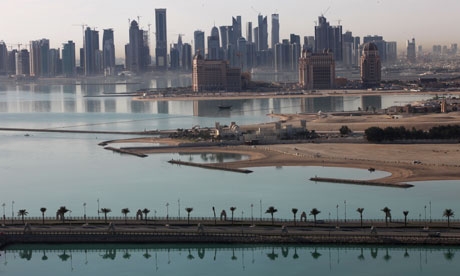Global warming and the projected sea level rising will have serious consequences for the Middle East and North Africa (Mena) region, according to two leading experts.
One of the world’s leading experts on climate change science Dr Hans Joachim Schellnhuber said sea level is expected to rise at least three meters in a very long term posing threat to many Gulf countries those are having flat coast line like Qatar.
Dr Hans, founding director of Potsdam Institute for Climate Impact Research (PIK) in Germany said: If you have a 100 meters cliff you need not worry. But countries like Qatar have got a flat coastline. Qatar can perhaps build up coastal walls like Netherlands. It not only means spending billions of dollars, but will change the landscape of the country, he said.
Dr Hans said the “three-meter rise” will not happen across the globe. In most cases it will happen in sub tropics and tropics. The impact would be more on South Sea and Indian Ocean. This is a big challenge”, Prof Hans told The Peninsula. The increasing temperatures are also likely to impact on the wind and precipitation patterns of the Gulf region.
Dr Hans is a long-standing member of the Intergovernmental Panel on Climate Change, which was awarded the Nobel Peace Prize in 2007, and has written several authoritative papers on the subject. For several years he was a principal adviser to the President of the European Union Commission, and he still advises Angela Merkel, the German Chancellor, on climate change. It was Dr Hans who put forward the target of 2 degree Celsius, which has been adopted as the target for global warming adopted by governments across the world.
Commenting on the climate change report released by the World Bank, a top executive of the bank said the Arab people are already experiencing the effects of a changing climate.
The year 2010 was the warmest since the late 1800s, with 19 countries setting new national temperature highs. Five of these were Arab countries, including Kuwait, which set a record high of 52.6 degree Celsius in 2010, only to be followed by 53.5 degree Celsius in 2011.
Temperatures are projected to rise by three to four degrees Celsius in the Arab world, which includes countries in the Middle East, North Africa and the Horn of Africa, by the end of the century.
Such an increase would be 1.5 times faster than the global average, meaning people in the region would be regularly living with temperatures around of 54 to 55 degrees Celsius.
The World Bank report noted water scarcity will increasingly be a challenge in the Arab countries. It is estimated that climate change will reduce water runoff by 10 percent by 2050. The region that currently face a water deficit is projected to increase its demand further by 60 percent by 2045.
Junaid Kamal Ahmad, Sustainable Development Sector, World Bank, Mena, said the bank is closely working with several countries in the region to mitigate the challenges. “We are actively involved in a huge renewable energy project in Saudi Arabia.
The bank has also plans to seriously engage with Qatar”, he said.
The Peninsula
7 December








































































